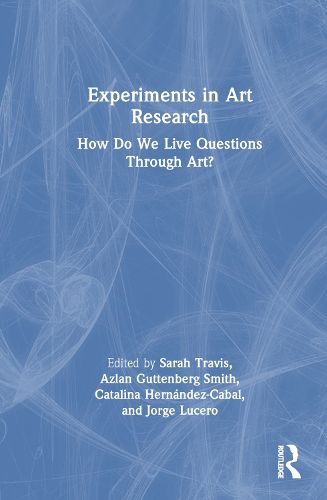Readings Newsletter
Become a Readings Member to make your shopping experience even easier.
Sign in or sign up for free!
You’re not far away from qualifying for FREE standard shipping within Australia
You’ve qualified for FREE standard shipping within Australia
The cart is loading…






Experiments in Art Research: How Do We Live Questions Through Art? is not a conventional research methods guide; it's an encounter for asking questions through art.
Originating from the work of a community of tightly connected scholars, artists, and teachers, the book unfolds through a tapestry of moments, practices, and people, embracing the celebration of works in progress and in community. Rooted in the practice of permission-giving, the narrative intertwines personal stories-laying bare the transformative power of unconventional teaching methods, risky endeavors, and the breaking of scholarly norms-and begins by understanding that "art" and "research" are not separate. After that, there are endless directions to take up. Instead of a handbook offering rules or best practices, this text offers an inspiring collection of joy, longing, and determination.
This is fascinating reading for arts-based researchers, artists, educators in the arts, education scholars, research-creators, performance theorists, art history scholars, art education scholars, inter- and anti-disciplinary scholars, qualitative and post-qualitative researchers, decolonization scholars, public humanities scholars, and writing pedagogy scholars.
$9.00 standard shipping within Australia
FREE standard shipping within Australia for orders over $100.00
Express & International shipping calculated at checkout
Experiments in Art Research: How Do We Live Questions Through Art? is not a conventional research methods guide; it's an encounter for asking questions through art.
Originating from the work of a community of tightly connected scholars, artists, and teachers, the book unfolds through a tapestry of moments, practices, and people, embracing the celebration of works in progress and in community. Rooted in the practice of permission-giving, the narrative intertwines personal stories-laying bare the transformative power of unconventional teaching methods, risky endeavors, and the breaking of scholarly norms-and begins by understanding that "art" and "research" are not separate. After that, there are endless directions to take up. Instead of a handbook offering rules or best practices, this text offers an inspiring collection of joy, longing, and determination.
This is fascinating reading for arts-based researchers, artists, educators in the arts, education scholars, research-creators, performance theorists, art history scholars, art education scholars, inter- and anti-disciplinary scholars, qualitative and post-qualitative researchers, decolonization scholars, public humanities scholars, and writing pedagogy scholars.